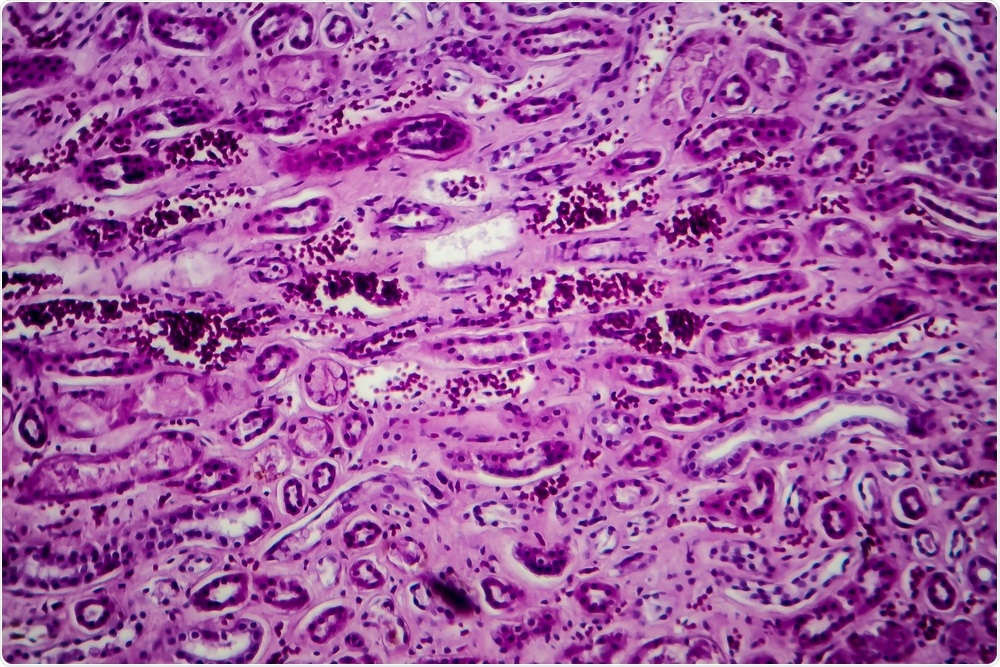Chandra Mohan, a Hugh Roy and Lillie Cranz Cullen Endowed Professor of biomedical engineering at the University of Houston, and his colleagues have identified a race-specific variance in the urinary biomarker proteins of lupus nephritis (LN) in patients.

Image Credit: Kateryna Kon/Shutterstock.com
The study outcomes have been reported in the Nature Communications journal.
Among African American patients, the most discriminatory biomarkers that distinguished active LN from inactive disease were urine ALCAM, PF-4, properdin, and VCAM-1.”
Chandra Mohan, Hugh Roy and Lillie Cranz Cullen Endowed Professor of Biomedical Engineering, University of Houston
Mohan has been working jointly with a biotech partner to target the ALCAM protein with novel therapeutics that could inhibit it in patients suffering from LN. They found other urine proteins also vary among Asian and Caucasian patients.
Mohan explained, “The best biomarkers lend themselves to be the best therapeutic targets because they tend to be disease drivers, and that is what is happening here with ALCAM.”
Systemic Lupus Erythematosus (SLE), also known as lupus, is an autoimmune disease that occurs when the body considers its own tissues and organs as a foreign particle and attacks it. Inflammation caused by the disease can have an adverse effect on various parts of the body, like joints, blood cells, skin, kidneys, brain, and heart.
Lupus nephritis is considered the most prevalent and severe clinical manifestations of SLE, which is a major cause of morbidity and mortality.
While patient demographics are widely known to affect SLE disease manifestations and outcomes, there are virtually no studies investigating this phenomenon in the context of disease biomarkers. Most SLE biomarker studies focus on one demographic group or all ethnic groups combined, which yield results that may not be equally predictive in all demographic groups of SLE patients.”
Chandra Mohan, Hugh Roy and Lillie Cranz Cullen Endowed Professor of Biomedical Engineering, University of Houston
Mohan and his colleagues used an aptamer-based screen with the potential to concurrently investigate over 1,100 unique proteins, instead of using conventional biomarker discovery study designs based either on previous insights into the established pathways that underlie LN or on protein analysis.
In this assay, streptavidin-coated beads labelled with 1,129 unique aptamers are added to each urine sample to allow them to bind to their designated protein targets.”
Chandra Mohan, Hugh Roy and Lillie Cranz Cullen Endowed Professor of Biomedical Engineering, University of Houston
Aptamers, which are single-stranded, synthetic DNA-based molecular recognition elements, selectively identify and measure a wide range of proteins in body cells or fluids.
“This is one of the largest, if not the largest, screening platforms currently available,” noted Mohan, who made use of the screening on 74 healthy individuals, 107 patients with active lupus nephritis, 127 patients with inactive lupus, and 67 with active non-renal lupus.
In light of the noted variation in urine biomarkers among different ethnicities, Mohan and his colleagues intend to carry out a longitudinal study that monitors patients for months or years. This will help predict the flares of the disease before their occurrence.
Source:
Journal reference:
Stanley, S., et al. (2020) Comprehensive aptamer-based screening identifies a spectrum of urinary biomarkers of lupus nephritis across ethnicities. Nature communications. doi.org/10.1038/s41467-020-15986-3.